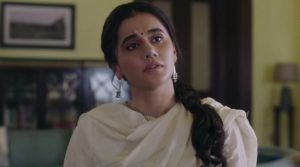
Bollywood Redux Film Review “Thappad”
WATCH THE TRAILER HERE
First, the Recap:
What is boiling under the surface of perceived perfection? We can find ourselves idolizing or at minimum envying those who seem to “have it all”, lives that reflect the physical trappings of success in all its forms–career, marriage, monetary wealth, and all the associated possessions. Yet, how is it that more and more we hear the tales of such idyllically blessed individuals being shattered by personal issues that reveal what lies beyond the gloss? For Amrita (Taapsee Pannu), all the aforementioned gains are her life thanks to a highly successful husband, Vikram (Pavail Gulati), who’s on the cusp of an even larger opportunity. But when an unanticipated announcement comes to Vikram’s attention at a house party he and Amrita are hosting, it sets in motion what will become a single moment of volatility that will impact and reshape Amrita’s viewpoints of life forever.
Next, my Mind:
Representing another of South Asian film’s fixed but still newer talents, we again get a deftly handled glimpse of exactly what prowess is percolating behind the camera within India’s highly prolific Bollywood machine via established but still newer generation filmmaker Anubhav Sinha. While previous efforts such as “Ra.One“, “Mulk” and “Article 15” have allowed his chops to be wonderfully demonstrated through working with top notch actors, several projects on the horizon, including “Anek“, “Bheed“, and “Abhi Toh Party Shuru Hui Hai“, boast similar star power that promise to deliver what should be excellent performances thanks to Sinha’s already proven track record. With confirmed successes under his belt, these other projects make him one to watch, again not just within the South Asian market, but ideally around the world for film lovers to be introduced to and enjoy.
When initially understanding the basic premise of this feature film effort from writer/director/producer Sinha, writer Mrunmayee Lagoo, producers Hetvi Karia, Bhushan Kumar, and Krishan Kumar, co-producer Vinod Bhanushali, and executive producer Sagar Shirgaonkar, it might be an assumption that the primary gist of the project will be in relation to habitual domestic abuse and its consequences. While there is a certain degree of truth to this, the narrative we’re provided to witness takes that particular concept and narrows it down to a single but overtly blatant and unforeseen instance that reshapes one woman’s entire mind-set and perceptions of what it is to even be a woman in society and the injustices against them that never seem, at minimum, to find the resolutions or apologies that the situations warrant. This, for me anyway, really allowed the film to carry a much more dynamic tone and varied direction addressing abuse as illustrated from an isolated event as opposed to often depicted ongoing repeated incidents.
Having at first painted an image of a pristine, “perfect” existence that a couple has due to one woman’s husband’s business successes, the circumstances associated with said prosperity and affluence get jarringly interrupted, becoming a catalyst for one fleetingly violent encounter that then finds its recipient left in a haze of not just the physical and emotional ramifications of it, but now questioning everything she’s ever considered about relationships and even her own identity as a woman. From this point, the film follows her as themes centered on this enigmatic journey of ascertaining how to move forward from the event are delved into, from coping mechanisms, the striving to find any form of peace or comfort from family and friends, the anger and despair that is surfacing, facing the realization of justifications/rationalizations with no real, simple apology or admission of wrongdoing from her supposed forever partner, and then being made to feel it’s her fault somehow for “not understanding”.
This final aspect then leads to additional looks at being made to realize that all we accept sometimes isn’t remotely fair, and that just going along with it has taken away what was really desired from the start–happiness and respect. Additionally, I found it engaging to have two other specific side-stories being portrayed as undercurrents to the primary one, also focused on women in situations OF more long-standing abuse and how they are themselves having to deal with it while being involved in some form with the situation at hand that Amrita is contending with. It adds some extra layers of complexity and depth to the proceedings yet allows the foundational narrative to remain fully accessible and utterly feasible rather than those other tales being distractions from it. We are therefore privy to the ultimate outcomes of each of them through the film’s deeply impactful and affecting finale, and it at least paves the way for the ideas of reconciliation, separation with hope, moving on, and even the satisfaction that can be found in singleness.
Pannu is yet another of what I consider the standout talents in the Bollywood machine, more as she’s so deftly proven a significantly wide range of roles and genre styles that she firmly excels at throughout a still relatively newer career and presence in the industry, which has already yielded a prolific run of films. With this effort, she gets to put into action her ability to showcase understated intensity that burns with high emotion yet on the surface remains purposefully muted with moments of sheer explosive emotion that suits her role as Amrita, wife to a successful businessman that gets her world shattered when he slaps her during a party. With all notions about who she is, the state of being in a relationship, and suddenly being reminded of the place women hold in their culture, the means she utilizes to both confront the immediate situation while also trying to see change happen in the understanding everyone around her has about her newly acquired vantage point is enacted with conviction and believability through Pannu’s wonderfully executed performance.
Gulati likewise delivers his own standout performance through his role as Amrita’s husband Vikram, who’s receiving of bad news during what was to be a celebratory gathering becomes the flashpoint of his loss of control and reacting to it in the way he does. In the aftermath of it, his reality is also undermined, yet he seems to show no actual remorse or apologetic manner towards Amrita and even appears baffled when she starts to seriously withdraw from their connection, isolating him, and showing the signs of wanting out of their union. Yet he keeps persisting in his “innocence”, and as the situation becomes messier and messier, his attempts to manipulate others to his point of view begins to reveal his true colors in relation to the happenings and subsequent ripple effect it is having. Gulati navigates this fluctuating frame of mind and upheaval with precision and intent, making him a character we ultimately want to root for, yet also find ourselves loving to hate. This, too, is a credit to Gulati’s acting prowess and presence in the film.
Primary supporting roles once more abound in this style of film, here through Kumud Mishra and Ratna Pathak Shah as Amrita’s parents Sachin and Sandhya who are less than accommodating about the state of her and Vikram’s partnership in the wake of the events in play, Maya Sarao as Netra, a lawyer Amrita tries to turn to who has plenty of her own baggage to sort out, Geetika Vidya Ohlyan as Sunita, Amrita and Vikram’s house help who suffers in her own marriage as well, Tanvi Azmi as Vikram’s mother Sulakshana who lives with them and becomes a key factor in the couple’s conflict, Ankur Rathee and Naila Grewal as Amrita’s brother and his wife, who try their best to be a support to her in the midst of others’ doubts, Dia Mirza as Shavani, the couple’s neighbor who’s found solace in singleness, and Manav Kaul as Rohit, an award-winning journalist and husband to Netra despite his own dalliances outside their union.
Additional supporting turns arrive from Santanu Ghatak, Harsh Singh, and Purnendu Bhattacharya as two ranking business executives and Vikram’s boss who becomes the source of his agitation and outburst at the party where “the slap” occurs, Gracy Goswami as Shivani’s daughter Sania, whom Amrita teaches dance to, Sushil Dahiya as Vikram’s father Romesh, Ram Kapoor as Vikram’s lawyer Advocate Pramod Gujral, and Rohan Khurana as the affair Netra is involved with. Not mentioned earlier, a clever opening sequence in this film sets up a “when worlds collide” scenario that we see unfold as the story progresses, and it makes it interesting to see how these characters’ lives intersect. So, in total, “Thappad” definitively shows just how tough sustaining relationships can be a far greater challenge than what it took to create them, but does so through a situation that evocatively begs for us to stop and consider the more far-reaching messages about society it presents, and the necessary actualities that should be heeded when one choice can alter everything we think we comprehend and have control over.
As always, this is all for your consideration and comment. Until next time, thank you for reading!





